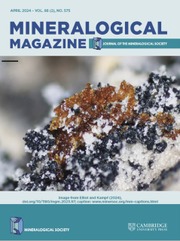Article contents
Geochemistry of a high-T hydrothermal dolostone from the Emirli (Ödemiş, western Turkey) Sb-Au deposit
Published online by Cambridge University Press: 05 July 2018
Abstract
A dolostone layer is found in spatial association with the Emirli epithermal Sb-Au deposit in western Turkey. It occurs within an argillic alteration zone adjacent to the major Emirli fault zone, which is the controlling structure for the deposit, and is composed of large closely packed subhedral to anhedral planar and nonplanar dolomites. Pyrite is the only accessory mineral in the layer and occurs as disseminations and veinlets up to 100 μm wide. Dolomite crystals are petrographically homogeneous and have consistent deep-red cathodoluminescence (CL) colour with no zoning which implies single-stage dolomitization of a calcitic precursor which is partly preserved as remnant patches of orange-coloured CL zones. Some crystal boundaries have dark (or no) CL colour. Electron microprobe line-scan analyses across these regions indicate intense enrichment of Fe and Mg depletion, revealing late-stage Fe-metasomatism (ankeritization) especially prevalent near pyrite veinlets and disseminations.
Dolomite crystals are composed of 52.4–55.0 mol.% CaCO3, 29.9 –41.2 mol.% MgCO3, 1.8 – 14.4 mol.% FeCO3 and 0.75 –3.2 mol.% MnCO3 indicating ferroan dolomite. The relationship between Ca and Mg is not stoichiometric due to substitution of Mg2+ by Fe2+ after dolomitization, as demonstrated by a strong negative correlation between Fe and Mg. Whole-rock Fe contents of the dolostone layer increases toward the Emirli fault zone.
The δ13C(PDB) compositions of the Emirli dolomite, calcitic marbles, and graphite-schists are in the ranges of –1.6 to 0.8‰, 1.5 to 1.5‰ and –6.6 to –23.5%, respectively, indicating that dolomite was formed due to interaction of light-carbon-enriched fluids with calcitic marbles; light-carbon may have been derived from decarboxylation of the graphitic schist layers. δ18O(PDB) values of dolomite and marble range –15.2 to – 11.2‰ and –2.4 to – 3.5‰, respectively. This large isotopic difference between dolomite and marble was probably inherited from oxygen isotope exchange between the dolomitizing fluid and the precursor calcites, as well as other minerals enriched in light-oxygen.
Fluid inclusions in dolomite are two-phase, and homogenize into liquid within the temperature interval 242 – 362ºC with a mode of 290ºC, and have salinities of 1 – 3 wt.% NaCl equiv. Using this modal temperature, the average δ18O(PDB) composition of water in isotopic equilibrium with the Emirli dolostone was estimated to be –19.4±2.1‰, which is interpreted as an indication of modified surface-waters; this interpretation is also supported by low fluid salinity and Na and Sr contents. These fluids migrated along graben-related faults, penetrating deeper levels where they were transformed into hydrothermal fluids due to the high heat-flow of the Küçük Menderes graben system, and flowed-up mainly through the Emirli and Haliköy faults that control mineralization in local deposits of Sb-Au and Hg, respectively. Due to interaction with chlorite-bearing graphite-schists, the fluid may have dissolved Mg2+ from chlorite and been enriched in isotopically-light carbon due to decarboxylation of graphite. Dolomitization occurred as a result of the interaction of these fluids with a calcitic marble band adjacent to the Emirli fault zone. Subsequent introduction of Fe2+ caused ankeritization along dolomite crystal boundaries during first-stage Sb-Au mineralization.
- Type
- Research Article
- Information
- Copyright
- Copyright © The Mineralogical Society of Great Britain and Ireland 2003
Footnotes
Deceased
References
A correction has been issued for this article:
- 14
- Cited by
Linked content
Please note a has been issued for this article.


